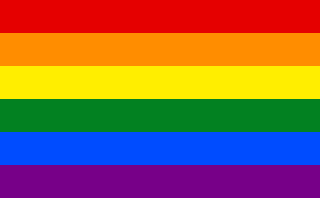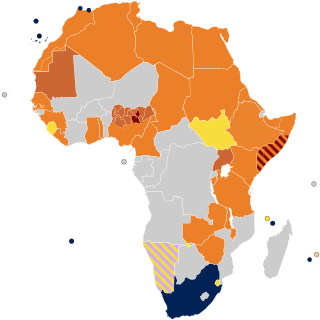
LGBT is an initialism that stands for lesbian, gay, bisexual, and transgender. In use since the 1990s, the initialism, as well as some of its common variants, functions as an umbrella term for sexuality and gender identity.

Lesbian, gay, bisexual and transgender (LGBT) rights in Australia have advanced over the latter half of the twentieth century and early twenty-first century to make Australia one of the most LGBT-accepting countries in the world, with opinion polls and the Australian Marriage Law Postal Survey indicating widespread popular support for same-sex marriage. A 2013 Pew Research poll found that 79% of Australians agreed that homosexuality should be accepted by society, making it the fifth-most supportive country surveyed in the world. With its long history of LGBT activism and annual Gay and Lesbian Mardi Gras festival, Sydney has been named one of the most gay-friendly cities in the world.

LGBT people in Azerbaijan face legal and social challenges not experienced by non-LGBT residents. Same-sex sexual activity has been legal in Azerbaijan since 1 September 2000. Nonetheless, discrimination on the basis of sexual orientation and gender identity are not banned in the country and same-sex marriage is not recognized.

Lesbian, gay, bisexual and transgender (LGBT) people in the People's Republic of China face legal and social challenges that are not experienced by non-LGBT residents. Same-sex couples are unable to marry or adopt, and households headed by such couples are ineligible for the same legal protections available to heterosexual couples. China provides no anti-discrimination protections for LGBT people, nor does it prohibit hate crimes based on sexual orientation or gender identity.

Lesbian, gay, bisexual, and transgender (LGBT) persons in Uganda face legal challenges, active discrimination and stigmatisation not experienced by non-LGBT residents. Both male and female homosexual activity are illegal in Uganda. Under the Penal Code, "carnal knowledge against the order of nature" between two males carries a potential penalty of life imprisonment.

Laws governing lesbian, gay, bisexual, and transgender (LGBT) rights are complex in Asia, and acceptance of LGBT persons varies widely. Same-sex sexual activity is outlawed in at least twenty Asian countries. As of 2023, Cyprus, Israel and Taiwan provide a wider range of LGBT rights – such as same-sex relationship recognition, while at least nine countries, such as Georgia, Singapore and Thailand, have enacted protections for LGBT people. In Afghanistan, Brunei, Iran, Qatar, Saudi Arabia, the United Arab Emirates and Yemen homosexual activity is punishable with the death penalty. In addition, LGBT people also face extrajudicial executions from non-state actors such as the Islamic State of Iraq and the Levant and Hamas in the Gaza Strip. While egalitarian relationships have become more frequent in recent years, they remain rare.

With the exception of South Africa and Cape Verde, lesbian, gay, bisexual, and transgender (LGBT) rights in Africa are limited in comparison to the United States, Canada, Western Europe, Australia, and New Zealand. Out of the 55 states recognised by the United Nations or African Union or both, the International Gay and Lesbian Association stated in 2015 that homosexuality is outlawed in 34 African countries. Human Rights Watch notes that another two countries, Benin and the Central African Republic, do not outlaw homosexuality, but have certain laws which discriminate against homosexual individuals.

Discussions of LGBT rights at the United Nations have included resolutions and joint statements in the United Nations General Assembly and the United Nations Human Rights Council (UNHRC), attention to the expert-led human rights mechanisms, as well as by the UN Agencies.

Intersex people are individuals born with any of several sex characteristics including chromosome patterns, gonads, or genitals that, according to the Office of the United Nations High Commissioner for Human Rights, "do not fit typical binary notions of male or female bodies".

Christopher Senyonjo is a clergyman and campaigner for LGBT rights in Uganda. He was elevated to bishop in the Church of Uganda in 1974 and retired in 1998. In 2001, he was barred from performing services. Whilst it is widely claimed that this is because of his stance on gay rights, the church claims that it was because of his participation in the consecration of a man to be a bishop of a church with which the Church of Uganda is not in communion. He has since worked with the Charismatic Church of Uganda and the progressive Episcopal Church of the United States, and founded Integrity Uganda and the Saint Paul's Reconciliation and Equality Centre in Kampala. In 2006 the Church of Uganda declared him "no longer a bishop" and revoked all remaining privileges for his involvement with the Charismatic denomination. For his stance Senyonjo has received several honours including the Clinton Global Citizen Award, and has been invited to participate in documentaries and international speaking tours.

Kasha Jacqueline Nabagesera is a Ugandan LGBT rights activist and the founder and executive director of the LGBT rights organization Freedom & Roam Uganda (FARUG). She received the Martin Ennals Award for Human Rights Defenders in 2011 and the Right Livelihood Award in 2015.

Intersex civil society organizations have existed since at least the mid-1980s. They include peer support groups and advocacy organizations active on health and medical issues, human rights, legal recognition, and peer and family support. Some groups, including the earliest, were open to people with specific intersex traits, while others are open to people with many different kinds of intersex traits.

Pepe Julian Onziema is a Ugandan born transgender LGBT rights and human rights activist. In 2012, he was named a Global Citizen by the Clinton Global Initiative for his work in human rights advocacy. He began his human rights work in 2003, which has twice led to his arrest. He has since participated in organizing LGBT pride celebrations in Uganda.

Intersex people are born with sex characteristics, such as chromosomes, gonads, or genitals, that, according to the UN Office of the High Commissioner for Human Rights, "do not fit typical binary notions of male or female bodies."

Intersex people are born with sex characteristics, such as chromosomes, gonads, or genitals that, according to the UN Office of the High Commissioner for Human Rights, "do not fit typical binary notions of male or female bodies". "Because their bodies are seen as different, intersex children and adults are often stigmatized and subjected to multiple human rights violations".

Intersex people are born with sex characteristics that "do not fit the typical definitions for male or female bodies". They are substantially more likely to identify as lesbian, gay, bisexual, or transgender (LGBT) than the non-intersex population, with an estimated 52% identifying as non-heterosexual and 8.5% to 20% experiencing gender dysphoria. Although many intersex people are heterosexual and cisgender, this overlap and "shared experiences of harm arising from dominant societal sex and gender norms" has led to intersex people often being included under the LGBT umbrella, with the acronym sometimes expanded to LGBTI. Some intersex activists and organisations have criticised this inclusion as distracting from intersex-specific issues such as involuntary medical interventions.

Intersex people in Uganda face a dangerous environment, with significant gaps in protection from mutilation and non-consensual cosmetic medical interventions and protection from discrimination.
This is a list of notable events in LGBT rights that took place in the 2010s.













